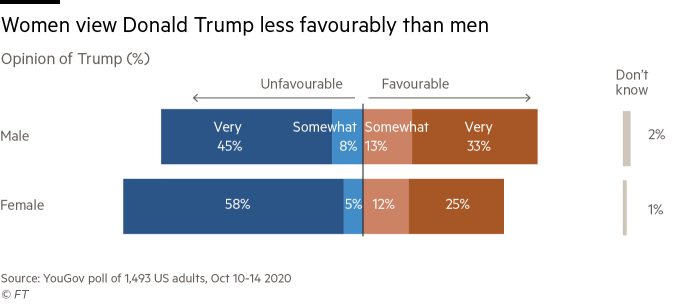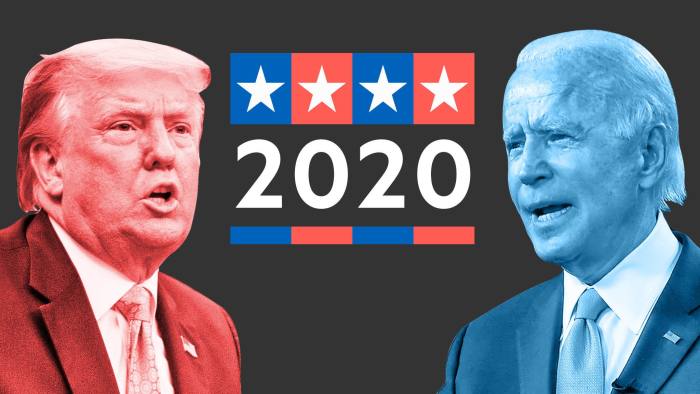
‘Please like me’: Trump loses ground with suburban women
In 2016, Michelle Fitting, a 50-year-old registered Republican in the Philadelphia suburbs, decided not to vote for either candidate because she strongly disliked Donald Trump and Hillary Clinton.
“My reasoning at the time was how bad could it be,” she said, referring to the possibility of a Trump presidency. “Now, I clearly understand how bad it can be.”
This time, Ms Fitting is voting for Democrat Joe Biden, even if it means the reversal of certain favourable policies, such as the Trump tax cuts. “I would rather pay the extra taxes and have somebody in there I can respect and look up to.”
In the final months of the race, Mr Trump has increasingly targeted suburban women such as Ms Fitting, a demographic his campaign believes he must win to stay in the White House. The president won a majority of white women in 2016, but that support has eroded over the past four years, with national polls showing Mr Trump now facing a 12 to 30 point gender gap among all female voters.
The president’s campaign has attempted to close the divide with a blunt law-and-order message designed to appeal to what he calls “the Suburban Housewives of America”. He says he is the only thing preventing race-related protests that broke out in some US cities earlier this summer from spilling over into the suburbs.
Mr Trump has also touted his administration’s reversal of an Obama-era fair-housing rule, claiming the change had destroyed the suburbs by paving the way for an influx of poorer residents that resulted in higher crime and lower property values. Critics say such claims are racist “dog whistles”.
No one appears to be more cognisant of his fallen standing among the demographic than Mr Trump himself. “Suburban women, will you please like me?” the president pleaded in Johnston, Pennsylvania on Tuesday at one of his first rallies since being hospitalised with Covid-19. “I saved your damn neighbourhood. OK?”
However, Kathleen Dolan, a political-science professor at the University of Wisconsin Milwaukee, said even the Trump campaign’s use of the term “suburban women” was outdated because it carried a racial and socio-economic connotation that did not reflect the demographic make-up of today’s suburbs.
A Monmouth University poll in September found three in four Americans and four in five American women believed it was important to have more racially integrated neighbourhoods.

“The president and the campaign misuse the term [suburban women] because they don’t seem to understand the ways that the suburbs have diversified,” Ms Dolan said.
Liz Kaminetz, 48, a former Republican in the Philadelphia suburbs who changed her party affiliation in 2016, said she did not recognise the suburbs Mr Trump describes, noting that most of her neighbours were supportive of the Black Lives Matter movement.
“To hear our president . . . align himself with white supremacists is far more scary to me,” she said, referring to Mr Trump’s instruction to the white-nationalist group Proud Boys at last month’s debate, whom he told to “stand back and stand by”.
Nan Whaley, the Democratic mayor of Dayton, Ohio, said Mr Trump saw the suburbs as “Richard Nixon’s suburbs” of the 1960s, when they were overwhelmingly white and segregated. “The suburbs are much more diverse now — they’re not just white women.”
At the time of the 2010 census, about 35 per cent of suburban residents were non-white, compared with just 19 per cent in 1990.
Ms Whaley said the way Mr Trump was handling the pandemic was also causing some suburban Republican women to reassess him. “If you’re a woman in the suburbs worrying about your kids, given all the shit we’ve placed on women during Covid, you can’t say things are better.”
Deborah Spencer, a Republican voter in Blacksburg, Virginia, who voted for Mr Trump in 2016, said she was still torn about which way to vote in November, a feeling that she has not had before.
While she does not like Mr Trump personally, describing him as “egoistical” and “pigheaded”, she believed he was “getting the job done”, or at least he had been until the pandemic.
“What he should have done is wear a mask and taken [the virus] seriously,” she said.
Mr Trump’s declining popularity among suburban women is but one example of an increasingly stark gender divide in US politics. A September poll of Iowa found Mr Trump and Mr Biden tied overall, but the Republican led by 21 points with men, and the Democrat by 20 points with women.

“I don’t know that there’s any race in the history of presidential polling in Iowa that shows this kind of division,” Ann Selzer, the veteran pollster who conducted the survey, told the Des Moines Register at the time.
However, polls show the majority of female registered Republicans are still planning to vote for Mr Trump in the next election.
Patti Singer, a conservative voter in Marietta, Georgia, said Mr Trump could come across as “somewhat of a bully”, for example in the first debate, but that she supported his policies. “I’m not a fan of Trump as a person but he’s kept his word. I support anyone who believes in law and order.”
Swamp notes

In the countdown to the 2020 election, stay on top of the big campaign issues with our newsletter on US power and politics with columnists Rana Foroohar and Edward Luce. Sign up here
At the same time, political scientists have pointed to Mr Trump’s bombastic rhetoric and perceived bullying as two of the main deterrents for this segment of the electorate.
After the first presidential debate, Patty Kish, a 61-year-old life-long Republican who lives in the suburbs of Virginia, said she did not “see any possible way” she could vote for Mr Trump, whom she backed in 2016.
However, just two weeks later, she was having second thoughts. Watching the confirmation hearings for Amy Coney Barrett, Mr Trump’s nominee to the Supreme Court, had reminded her why she was a Republican, she said. And polls suggesting Democrats could sweep the White House and both chambers of Congress made her worried about what the party might do with so much power.
“My fear is we are going to lose the House, we are going to lose the Senate, and we may need a check in place. And that may be, as awful as it sounds, having Trump in place for more four years,” she added.
Right now, she is weighing two choices: voting for Mr Trump, or not casting a vote for president at all. “I might not make my decision until the day of. The way this world is who knows what could happen?”
Additional reporting by Demetri Sevastopulo in Washington

